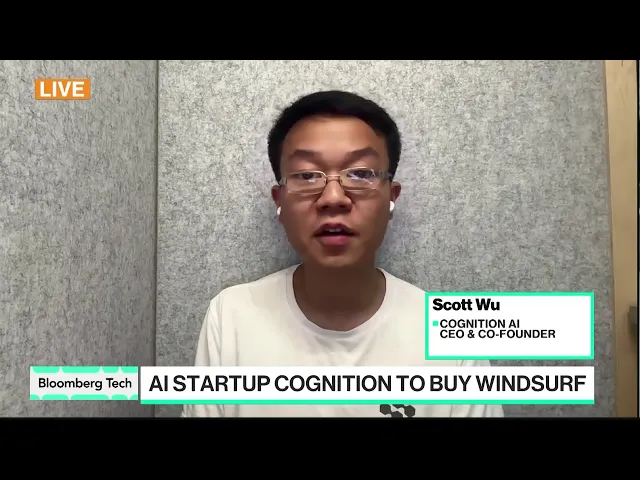Cognition AI Buys Windsurf After Google Licensing Deal

Cognition AI's smart move reshapes AI market
In a decisive power play that's sending ripples through the AI industry, Cognition AI has acquired Windsurf following a significant licensing agreement with Google. This development marks a crucial moment in the evolution of open-source AI models, showcasing how strategic partnerships and acquisitions are rapidly reshaping the competitive landscape in artificial intelligence.
Key Developments
-
Cognition AI secured a comprehensive licensing deal with Google that grants them access to advanced AI models, providing a substantial competitive edge in the increasingly crowded AI market.
-
The strategic acquisition of Windsurf represents a calculated move to expand Cognition AI's capabilities and potentially challenge established players like Anthropic and OpenAI.
-
This business maneuver signals a shift in how AI companies are positioning themselves, with licensing agreements becoming an alternative pathway to building competitive AI solutions without starting from scratch.
The New AI Playbook
The most compelling aspect of this story isn't just the acquisition itself, but what it reveals about the evolving business strategies in AI development. Traditionally, companies faced a binary choice: build proprietary models from the ground up (like OpenAI) or rely completely on open-source alternatives. Cognition AI is charting a third path that combines licensing agreements with strategic acquisitions.
This matters tremendously because it potentially lowers the barrier to entry for creating competitive AI products. Rather than spending hundreds of millions on training infrastructure and talent, companies can license foundation models from tech giants and focus their resources on specialized applications, interface design, and market fit. This could accelerate innovation across the industry while allowing more diverse players to participate in the AI revolution.
Beyond the Headlines
What the news doesn't fully explore is how this model of development might affect the economics of AI startups. When I spoke with several AI venture capitalists last month, they consistently mentioned that capital requirements were becoming a major concern for early-stage AI companies. Many promising startups were burning through funding before achieving product-market fit, simply due to the enormous costs of training large language models.
The Cognition AI approach potentially offers a template for more capital-efficient AI development. By licensing foundational technology and focusing resources on differentiation and user experience, startups might achieve viable products with significantly less upfront investment. Take Hugging Face, for example, which has built a
Recent Videos
How To Earn MONEY With Images (No Bullsh*t)
Smart earnings from your image collection In today's digital economy, passive income streams have become increasingly accessible to creators with various skill sets. A recent YouTube video cuts through the hype to explore legitimate ways photographers, designers, and even casual smartphone users can monetize their image collections. The strategies outlined don't rely on unrealistic promises or complicated schemes—instead, they focus on established marketplaces with proven revenue potential for image creators. Key Points Stock photography platforms like Shutterstock, Adobe Stock, and Getty Images remain viable income sources when you understand their specific requirements and optimize your submissions accordingly. Specialized marketplaces focusing...
Oct 3, 2025New SHAPE SHIFTING AI Robot Is Freaking People Out
Liquid robots will change everything In the quiet labs of Carnegie Mellon University, scientists have created something that feels plucked from science fiction—a magnetic slime robot that can transform between liquid and solid states, slipping through tight spaces before reassembling on the other side. This technology, showcased in a recent YouTube video, represents a significant leap beyond traditional robotics into a realm where machines mimic not just animal movements, but their fundamental physical properties. While the internet might be buzzing with dystopian concerns about "shape-shifting terminators," the reality offers far more promising applications that could revolutionize medicine, rescue operations, and...
Oct 3, 2025How To Do Homeless AI Tiktok Trend (Tiktok Homeless AI Tutorial)
AI homeless trend raises ethical concerns In an era where social media trends evolve faster than we can comprehend them, TikTok's "homeless AI" trend has sparked both creative engagement and serious ethical questions. The trend, which involves using AI to transform ordinary photos into images depicting homelessness, has rapidly gained traction across the platform, with creators eagerly jumping on board to showcase their digital transformations. While the technical process is relatively straightforward, the implications of digitally "becoming homeless" for entertainment deserve careful consideration. The video tutorial provides a step-by-step guide on creating these AI-generated images, explaining how users can transform...
